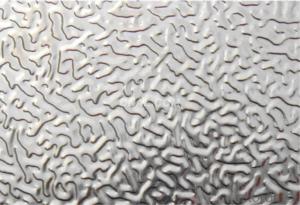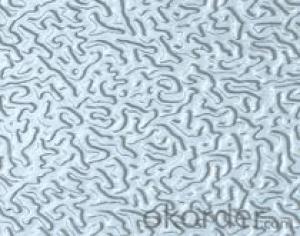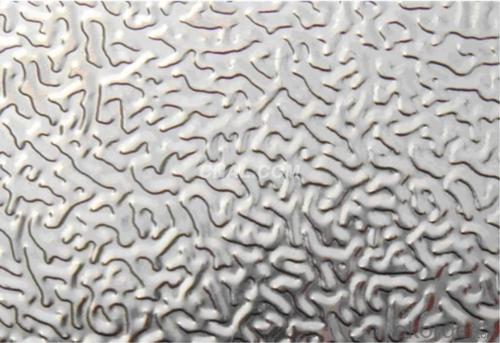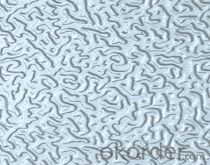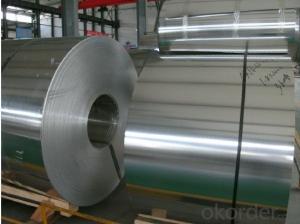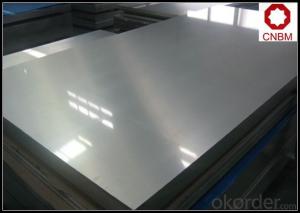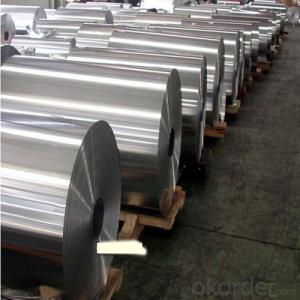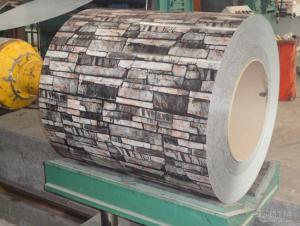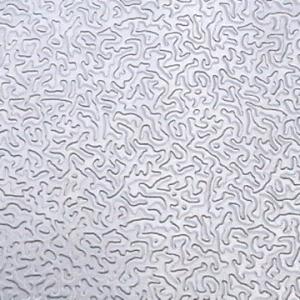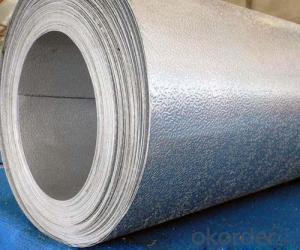Lennox Embossed Aluminum Stucco for Air-Conditionary Coils
- Loading Port:
- Shanghai
- Payment Terms:
- TT OR LC
- Min Order Qty:
- 4 m.t.
- Supply Capability:
- 100000 m.t./month
OKorder Service Pledge
OKorder Financial Service
You Might Also Like
1.Structure of Embossed Aluminum Stucco for Air-Conditionary :
Embossed Aluminum Stucco for Air-Conditionary is widely used in the manufacturing of air-conditionary.Embossed Aluminum Stucco for Air-Conditionary is popular in Africa, Middle East and America markets
2.Main Features of the Embossed Aluminum Stucco for Air-Conditionary:
• Beautiful parten
• High manufacturing accuracy
• High strength of extension and yield
• Well packaged
• No marks, no scratch, no excessive oil
3. Embossed Aluminum Stucco for Air-Conditionary
Alloy: 1050, 1060, 1070, 1100, 3003, 3004, 3005, 3105, 5052, 5083, 5754, 8011, 8006
Temper: H14, H16, H18, H22, H24, H26, H32, O/F
Thickness: 0.2mm-20mm
Width: 10mm-1500mm
4. Production of Embossed Aluminum Stucco for Air-Conditionary
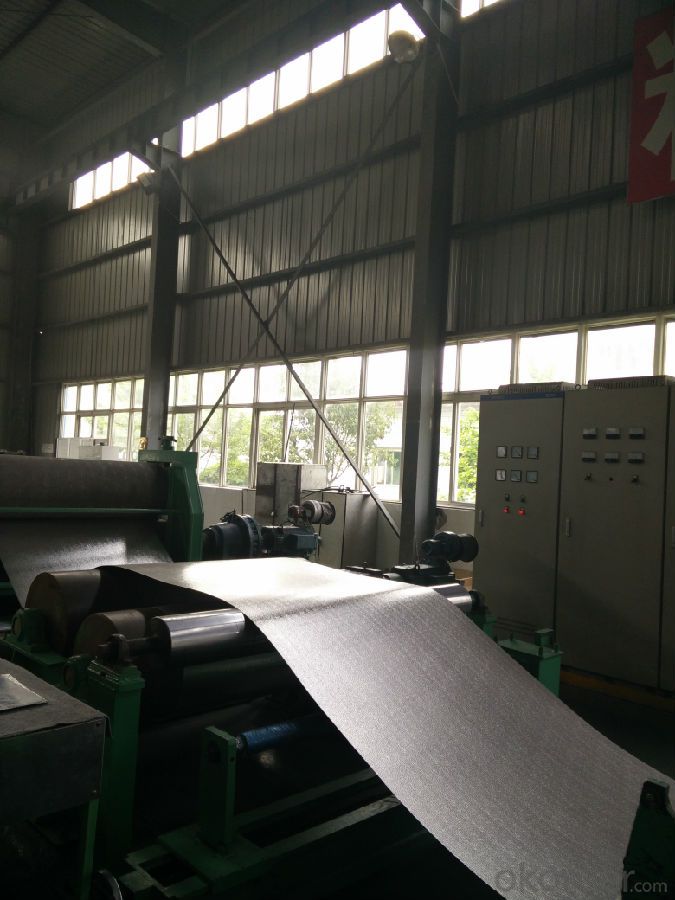
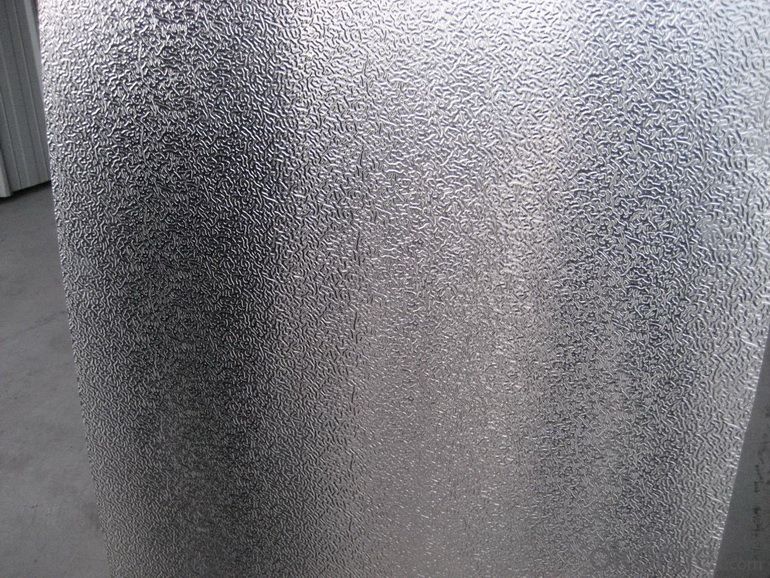
5.FAQ
We have organized several common questions for our clients,may help you sincerely:
① How about your company?
A world class manufacturer & supplier of aluminum coil and alloy blanks. Aluminum production base is comprised of 18 aluminum annealers, 10 coil and foil mills, 4 continuous production lines, 2 hot rolling production line and 3 prepainted lines.
Export 5000 tons per month to Asia, America and Middle East. Always do the best for our clients.
②Can you guarantee the quality of the products?
We are responsible for the quality of materials to get a long-term cooperation with clients in a reasonable period of time and we are glad to arrange and coordinate any third party inspection for you.
③What is the delivery time after purchase?
35 day after receiving client’s deposit or correct LC
- Q: How are aluminum coils protected against mechanical damage?
- Aluminum coils are protected against mechanical damage through several methods. One of the primary ways is by applying a protective coating or finish to the surface of the coil. This coating acts as a barrier between the coil and any potential sources of mechanical damage, such as impact or abrasion. The coating can be a paint or a specialized coating designed specifically for aluminum, which provides enhanced durability and resistance to scratching or denting. In addition to the protective coating, aluminum coils may also be reinforced with a layer of laminate or film. This additional layer adds an extra level of protection against mechanical damage and can help prevent dents or scratches from occurring. The laminate or film can be applied during the manufacturing process or added as a separate step after the coil has been produced. Furthermore, aluminum coils may be wrapped or packaged in protective materials such as plastic or foam to minimize the risk of mechanical damage during transportation or storage. These protective wrappings help cushion the coil and provide a barrier against impacts or heavy objects that could potentially cause damage. Overall, the combination of protective coatings, laminates, and packaging materials helps to ensure that aluminum coils are adequately protected against mechanical damage. These measures help to maintain the integrity and quality of the coils, allowing them to perform effectively in various applications.
- Q: What is the balanced equation for copper (I) oxide and Aluminum?
- Copper(I) oxide is a solid and so is aluminum. Any reaction that might occur would have to be at an elevated temperature. This is a thermite reaction in which copper(I) is reduced to copper metal (molten) and aluminum is oxidized to aluminum oxide. 3Cu2O(s) + 2Al(s) -- 6Cu(s) + Al2O3(s) ========= Follow up ========== Do you mean in aqueous solution? There won't be any copper(I) chloride in aqueous solution. CuCl is very insoluble in water, but will undergo disproportionation to form Cu2+ ions and copper metal. Therefore, you would actually have a solution of copper(II) chloride. Copper(II) chloride will react with aluminum to form copper metal and aluminum ions. Ordinarily aluminum won't react with copper(II) ions. The reaction does proceed in the presence of chloride ion. This is because the chloride ion will react with the Al2O3 layer on the surface of aluminum metal to make [AlCl4]^- which exposes the aluminum metal below, and thus a reaction can occur. 3Cu2+ + 2Al(s) -- 2Al3+ + 3Cu(s)
- Q: Can aluminum coils be used in telecommunications infrastructure?
- Yes, aluminum coils can be used in telecommunications infrastructure. Aluminum is a lightweight and durable material that is commonly used in various industries, including telecommunications. The use of aluminum coils in telecommunications infrastructure offers several advantages. Firstly, aluminum is a cost-effective material compared to other metals like copper. It is readily available and has a lower price point, making it a preferred choice for many telecommunications companies. Additionally, aluminum coils are lighter in weight, which makes them easier to handle and install, reducing the overall labor and transportation costs. Moreover, aluminum has excellent electrical conductivity, making it suitable for transmitting data signals in telecommunications networks. Aluminum coils can effectively carry electrical current, ensuring efficient data transmission without any significant loss in quality. This conductivity enables reliable and high-speed communication over long distances. Another advantage of using aluminum coils in telecommunications infrastructure is their resistance to corrosion. Aluminum naturally forms a protective oxide layer when exposed to air, preventing it from rusting or corroding easily. This resistance to corrosion ensures the longevity and durability of the infrastructure, reducing maintenance and replacement costs over time. However, it is important to note that aluminum has a lower tensile strength compared to copper. Therefore, proper engineering and design considerations need to be taken to ensure the structural integrity of the infrastructure when using aluminum coils. Additionally, specific connectors and hardware compatible with aluminum may be required. In conclusion, aluminum coils can be effectively used in telecommunications infrastructure due to their cost-effectiveness, lightweight, electrical conductivity, and resistance to corrosion. Proper planning and design are necessary to ensure the successful implementation of aluminum coils in telecommunications networks.
- Q: How are aluminum coils used in the production of automotive heat shields?
- The production of automotive heat shields heavily relies on aluminum coils. These shields are vital in safeguarding different parts from excessive heat produced by the engine, exhaust system, or other heat sources. Typically, these shields are made from lightweight and heat-resistant materials, making aluminum coils a popular choice because of their exceptional thermal conductivity, durability, and corrosion resistance. To manufacture the heat shields, aluminum coils undergo a process of unwinding and cutting into sheets of the desired size. These sheets are then shaped using various techniques like stamping, bending, or deep drawing. Aluminum's malleability makes it perfect for creating heat shields with intricate geometries, ensuring a precise fit in the vehicle. Once the desired shape is achieved, the aluminum sheets are often treated with a surface coating to improve heat resistance and prevent corrosion. This coating can be in the form of a ceramic or metallic layer, serving as an additional barrier against extreme temperatures. Furthermore, the formed and coated aluminum sheets are usually combined with other insulating materials, such as ceramic fibers or laminated films, to further enhance the heat shield's performance. These additional layers aid in reducing heat transfer by reflecting or absorbing the heat energy, thus protecting surrounding components from potential damage or overheating. Finally, the assembled heat shields are affixed in specific locations within the vehicle, such as around the exhaust system or near the engine, using fasteners or adhesive techniques. The lightweight nature of aluminum coils ensures that the heat shields do not add unnecessary weight to the vehicle, which is crucial for maintaining fuel efficiency and overall performance. In conclusion, aluminum coils are extensively employed in the production of automotive heat shields due to their excellent thermal conductivity, durability, and corrosion resistance. Their ease of shaping and molding, coupled with surface coatings and additional insulating layers, guarantee effective heat insulation and protection for various vehicle components.
- Q: What are the precautions to be taken while handling aluminum coils?
- Some precautions to be taken while handling aluminum coils include wearing protective gloves to prevent cuts or injuries, using proper lifting techniques to avoid strain or back injuries, storing coils in a dry and well-ventilated area to prevent corrosion, using appropriate equipment and tools for handling and transportation, and following safety guidelines provided by the manufacturer. It is also important to be aware of the weight and balance of the coils to prevent accidents or damage.
- Q: What are the differences among various types of steel wires and their respective coiling techniques?
- <p>Yes, there are differences between different types of steel wires and their coiling methods. Steel wires can be categorized based on their composition, strength, and use, such as carbon steel, stainless steel, and alloy steel wires. Each type has unique properties that affect their coiling methods. For instance, carbon steel wires are strong and ductile, suitable for standard coiling techniques, while stainless steel wires offer corrosion resistance and may require special handling to prevent damage. The coiling methods also vary; some common ones include spool coiling, loop coiling, and pancake coiling. Each method has specific applications and considerations for wire diameter, tension, and storage. Understanding these differences is crucial for selecting the appropriate wire and coiling technique for a given application.</p>
- Q: Are aluminum coils resistant to oil and grease?
- Aluminum coils typically possess resistance against oil and grease. They exhibit a natural ability to resist corrosion and are not easily influenced by most solvents, including oil and grease. This characteristic renders aluminum coils a suitable option for diverse applications that involve potential contact with oils or greases, such as the automotive and HVAC sectors. Nevertheless, it is crucial to acknowledge that extended exposure to particular aggressive chemicals or high concentrations of oil or grease may gradually result in damage or deterioration of the aluminum coils. Consequently, it is advisable to diligently clean and maintain the coils to guarantee their optimal functioning and durability.
- Q: Are aluminum coils suitable for pharmaceutical vial caps?
- Yes, aluminum coils are suitable for pharmaceutical vial caps. Aluminum is a commonly used material in the pharmaceutical industry due to its excellent barrier properties, corrosion resistance, and ability to be easily sterilized. It provides a tight seal, ensuring the integrity and safety of the vial contents. Additionally, aluminum coils can be easily formed into the desired shape and size for vial caps, making them a reliable choice for pharmaceutical packaging.
- Q: Which would you guys recommend to a 13 year-old? I used a wooden bat at my last game, and I got a double to the left field wall, I don't think i've done that good with an aluminum bat all year. Should I continue using the wooden one? What do you guys think?
- An aluminum bat may or may not hit a baseball further, depending on who swings the bat. Both bats have advantages. First, let us compare the qualities of the two designs. The only real difference is weight. The aluminum bat is much lighter than the wooden bat. Because the aluminum bat is lighter, the batter has more control. It is easier to make last-minute adjustments to his swing. Once a wooden bat is swinging, adjustments are difficult. Also, less time is needed to get the aluminum bat moving. The batter can wait just a little bit longer before deciding how to swing with an aluminum bat. Because the wooden bat is heavier, it has less recoil: A wooden bat moving at the same speed as an aluminum bat will hit harder. A batter who can get a wooden bat moving fast will hit the ball further, provided he makes contact at all. Also, a wooden bat doesn't vibrate as much. This is better for the batter's hands. Overall, the wooden bat has more potential power, but the aluminum bat is easier to use. A very experienced player that can tell how the ball is pitched just as it leaves the pitcher's hand will do better with a wooden bat. The player that likes a little extra time to decide how to hit, as well as a little opportunity for slight adjustment, will do better with an aluminum bat. In the end, it is a matter of personal preference.
- Q: Is it safe to use aluminum coil for storing food?
- <p>Aluminum coil can be used for food storage, but with certain considerations. Aluminum is a good conductor of heat and is often used in cookware, but for long-term food storage, it's not ideal. It's important to ensure that the aluminum is coated or lined with a non-reactive material to prevent direct contact with food, as aluminum can leach into food and may have health implications. Additionally, aluminum is not recommended for acidic foods as it can react with them. For best food storage practices, consider using materials specifically designed for food contact, such as glass or food-grade plastic containers.</p>
Send your message to us
Lennox Embossed Aluminum Stucco for Air-Conditionary Coils
- Loading Port:
- Shanghai
- Payment Terms:
- TT OR LC
- Min Order Qty:
- 4 m.t.
- Supply Capability:
- 100000 m.t./month
OKorder Service Pledge
OKorder Financial Service
Similar products
Hot products
Hot Searches
Related keywords
